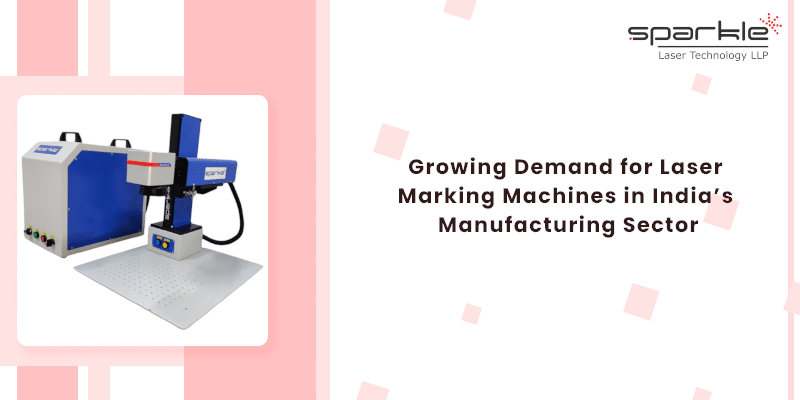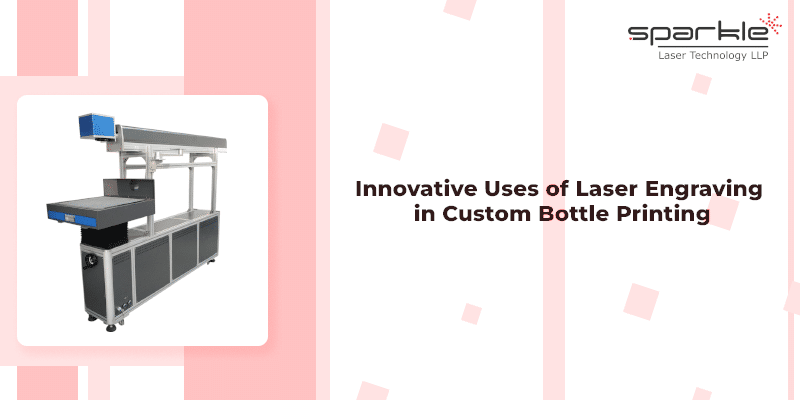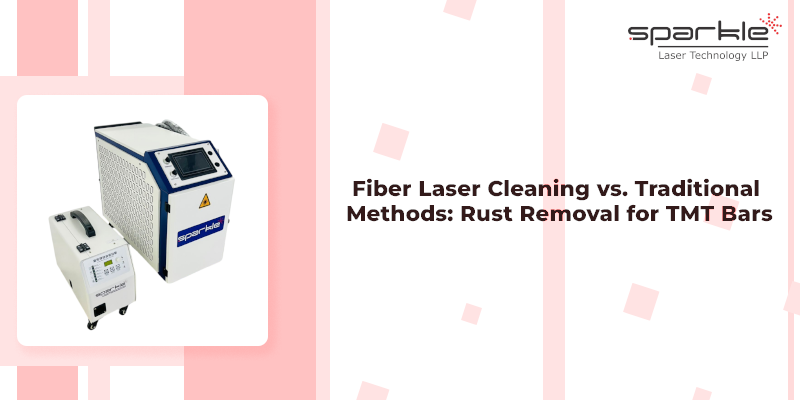India’s manufacturing sector is rapidly advancing, with “Make in India” initiatives and a global shift toward automation as the primary drivers. Companies are rapidly increasing automation and upgrading manufacturing processes in every conceivable area, including automotive and electronics to medical devices and packaging. Technology is playing a big part in the changes seen in the sector, especially the attention that laser marking machines are getting.
So, why are so many Indian manufacturers opting for laser marking? Here’s why!
What is a Laser Marking Machine?
A laser marking machine is a high-precision device that employs focused laser-beam optics to permanently mark or engrave a surface with text, serial numbers, QR codes, barcodes, or decorative design elements. Unlike ink or chemical-based processes, laser marking does not fade, peel, scratch, damage, or deface the material.
There are various types of laser marking technologies:
- Fiber laser marking : ideal for metals and plastics.
- CO2 laser marking : commonly used for wood, leather, paper, and packaging.
- UV laser marking : suited for delicate materials such as glass or silicon.
Due to their versatility, laser marking machines are essential tools in a wide variety of industries.
Comparison of Fiber, CO₂, and UV Laser Marking Machines
| Type | Best for Materials | Common Applications | Benefits |
| Fiber Laser | Metals (steel, aluminum, copper, gold, silver) & some plastics | Automotive parts, electronics, jewelry, medical devices | Long life (100,000+ hours), very efficient, accurate, permanent marking, low maintenance |
| CO₂ Laser | Wood, leather, acrylic, glass, ceramics, textiles, packaging materials | FMCG packaging, wooden crafts, clothing labeling, branding | Cost-effective, high-speed marking, best for organic/non-metallic materials |
| UV Laser | Glass, silicon wafers, plastics, thin films, delicate materials | Electronics (PCBA), medical devices, microchip packaging, syringes, screens | Ultra-fine marking, “cold processing” without damage, high contrast, ideal for sensitive surfaces |
Factors Influencing Demand in India
- Government Action : The government is guiding manufacturers with “Make in India” and PLI initiatives that encourage the application of progressive, environmentally friendly technologies. Laser marking is a well-suited technology.
- Industrial Growth : India’s auto industry, electronics players, and medical device markets are climbing at a meteoric rate. All of these industries require clear, permanent markings for safety, compliance, and traceability.
- Regulatory Compliance : Traceability and anti-counterfeiting are no longer optional in supply chains across the globe. Laser marked QR Codes, serial numbers, and batch codes provide transparency.
- Automation & Industry 4.0 : Manufacturers make shifts toward more autonomous smart factories. Laser machines lend themselves easily to automated production lines, so they are investments for the future.
Uses of Laser Marking Machines in Manufacturing
- Automotive: Marking parts (engine, chassis numbers, gears) with distinct identity numbers.
- Electronics: Engraving bar codes, QR codes and logos on PCBs, chips and electronic housings.
- Medical: Marking of surgical tools, implants and packaging for pharmaceuticals with sterilization resistance IDs.
- Consumer Products & Jewelry: Engraving brand logo, serial number and fine engraving.
- Aerospace & Defense: Permanent, tamper-proof identification of parts.
In short, laser marking is for all products that require durability, traceability, and authenticity.
Advantages of Laser Marking Machines:
1. Improved Accuracy
Laser marking machines produce incomparable accuracy, making them perfect for micro-markings like barcodes, serial numbers, and small text. Regardless of how small or convoluted the surface is, the marks are precise, sharp, and uniform. Accuracy is key for industries that have to abide by strict standards.
2. Permanent & Tamper Resistant Markings
Some inks or stickers can quickly wear down, peel away, or be completely removed. A laser marking is permanent and tamper resistant, which means they stand up against heat, chemicals, and abrasions and remain visible in the process. Completeness and durability is also critical in a lot of industries because of the process of a product’s authenticity.
3. Eco-Friendly
Laser marking machines are environmentally-friendly for many reasons, the most important being that they do not rely on inks, solvents, or chemicals. Because it is done without time-consuming consumables, you create less waste and reduce the impact on the environment. The manufacturer can expect to see reduced recurring costs and fulfill their sustainability targets.
4. Reduced Total Cost of Ownership
While it may appear to take a lot of capital to acquire a laser machine, the nice thing about lasers is they don’t require a lot of maintenance and offer a long operational life. By having no consumables and very little downtime, you have an excellent ROI (Return on Investment) and total cost of ownership.
5. Improved Production Efficiency
Laser marking is considerably faster than other marking methods so it can engage high volumes of manufacturing lines seamlessly. This enhances production flow, helps to eliminate bottlenecks, facilitates on-time deliveries, and improves operational efficiencies for busy manufacturing plants.
Challenges and Opportunities
- High Cost of Entry: Laser machines have a higher upfront cost than inkjet printers.
- Skill Gap: Operators require training to run and maintain these machines.
- After-Sales Service: Local support and maintenance are vital to gain acceptance.
Even with these challenges, the opportunities are huge. With India’s industrial growth, there is ample opportunity for even smaller and mid-sized businesses to take advantage of a laser marking machine.
Future Prospects
In the coming decade, India will see unprecedented adoption of laser technology, both as part of the government’s vision around “Make in India” (the business-friendly emphasis on producing and purchasing products made in India) and globally, due to demand for products and products that are made to be traceable, authenticated and verified.
Manufacturers across the entire spectrum of industry will choose laser marking to:
- Ensure compliance to international quality standards or export-related standards.
- Provide product authentication and anti-counterfeiting protection with permanent marks that are technically impossible to tamper with.
- Improve supply chain visibility with QR codes, barcodes and/or digital IDs.
- Reduce e-waste and chemical impact caused by switching away from chemical- or ink-based marking systems.
The transformation of India’s manufacturing sector will not be limited to large organizations. SMEs (small- and mid-sized enterprises) in India will also benefit from adopting compact, cost-effective laser marking and will be able to compete, both nationally and globally.
Final Thoughts
The laser marking machine market in India’s manufacturing industry is not just a trend, it is a need. From meeting obligations and safety regulations to branding and performance enhancements, laser technology is changing the face of Indian industries.
Manufacturers investing in laser technology today will be ahead of regulations and will position themselves for a strong competitive advantage over their global competitors. If you are a manufacturer, it is time to move towards laser marking because it is here.




